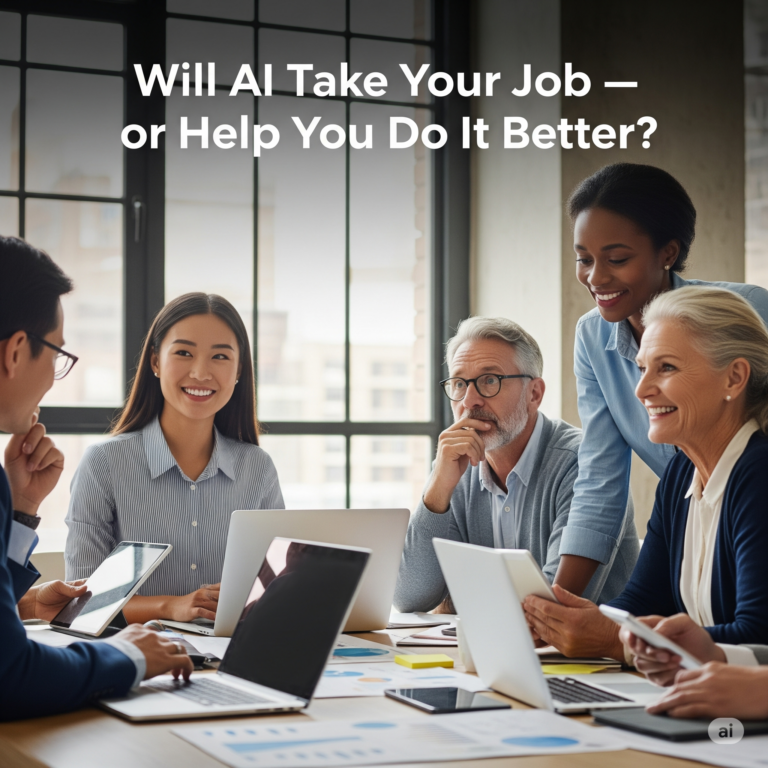- 🤖 Will AI Take Your Job — or Help You Do It Better?
- 🔍 Introduction: Fear, Facts, and the Future of Work
- 🛠️ 1. The Jobs AI Is Replacing (And Why That’s Not All Bad)
- 🤝 2. Humans + AI = The New Power Duo
- 🚀 3. New Roles Are Being Created — Right Now
- 🧑🏫 4. Reskilling: The Key to Thriving (Not Just Surviving)
- 🌍 5. The Human Edge: What AI Can’t Replace
- ⚠️ 6. But… Let’s Not Ignore the Risks
- ✅ Conclusion: AI Won’t Take Your Job — But Someone Using AI Might
🤖 Will AI Take Your Job — or Help You Do It Better?
🔍 Introduction: Fear, Facts, and the Future of Work
The rise of Artificial Intelligence is shaking up the workplace like never before. News headlines scream, “Robots are coming for your job!” Meanwhile, others promise a golden future where AI handles the boring stuff, and we all get to be more creative, strategic, and fulfilled.
So, what’s the truth? Will AI replace you — or will it become your most powerful coworker?
Let’s break down what’s really happening in 2025 — and what it means for your career, your skills, and your future.
🛠️ 1. The Jobs AI Is Replacing (And Why That’s Not All Bad)
Let’s be real: some jobs are disappearing.
Tasks that are repetitive, rule-based, and data-heavy are increasingly being automated. These include:
- Data entry and simple accounting
- Basic customer service chat
- Routine warehouse work
- Some administrative tasks
💼 But here’s the twist: automation isn’t eliminating roles — it’s eliminating tasks within roles.
That means most jobs aren’t vanishing — they’re evolving.
🤝 2. Humans + AI = The New Power Duo
Rather than replacing people, AI is becoming a productivity partner.
In 2025, professionals in nearly every industry are using AI to:
- Speed up research and analysis
- Get insights from huge data sets in seconds
- Write content, code, or reports faster
- Automate routine tasks and focus on creativity
💡 Example: Marketers now use AI to generate ad drafts, but the final voice and storytelling? That’s still human.
🧠 In finance, AI flags anomalies — but analysts make the final decisions.
🚀 3. New Roles Are Being Created — Right Now
While some jobs fade, AI is creating entirely new industries and career paths, such as:
- Prompt engineering
- AI ethics & compliance
- Human-AI interaction design
- AI operations and model tuning
- Data annotation and training roles
👩💻 Many of the fastest-growing jobs in 2025 didn’t exist 5 years ago.
This shift isn’t just about survival — it’s about opportunity.
🧑🏫 4. Reskilling: The Key to Thriving (Not Just Surviving)
The biggest challenge isn’t job loss — it’s skill mismatch.
Workers need help transitioning into AI-augmented roles. That’s why companies are now:
- Offering in-house AI training programs
- Partnering with ed-tech platforms
- Encouraging cross-functional learning
🎯 Microsoft and Google have launched global reskilling initiatives focused on AI literacy for non-tech professionals.
The future belongs to those who are willing to learn, adapt, and evolve.
🌍 5. The Human Edge: What AI Can’t Replace
Despite its speed and intelligence, AI lacks core human traits like:
- Empathy and emotional intelligence
- Critical thinking in complex, grey situations
- Leadership and ethical decision-making
- Creative innovation rooted in cultural context
Jobs that rely on these skills — from teachers and therapists to entrepreneurs and strategists — are not only safe but more in demand than ever.
💬 As AI gets smarter, human qualities get more valuable.
⚠️ 6. But… Let’s Not Ignore the Risks
AI’s rapid growth does come with serious challenges:
- Job displacement in low-skill sectors
- Bias in AI decision-making
- Inequality in access to upskilling opportunities
- Mental health impacts from workplace uncertainty
🌐 Governments, companies, and communities must work together to ensure AI benefits everyone — not just a few.
✅ Conclusion: AI Won’t Take Your Job — But Someone Using AI Might
The real question isn’t “Will AI replace me?”
It’s “How can I use AI to get better at what I do?”
In 2025, the most successful workers aren’t the ones who resist change — they’re the ones who work with AI, not against it.
So no, AI isn’t your enemy. But ignoring it? That just might be.


